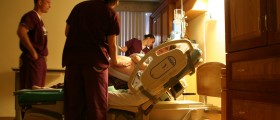
Down Syndrome
Down Syndrome (trisomy 21, trisomy G) is a geneticdisorder caused by the presence of an extra 21st chromosome.
The illness occurs in 1 of 800 children and causes the mentaldisorders and developmental problems. Related problems could vary from mild toserious ones. Mild condition is treated and such children and adults have morefunctional life.
Possible Causes
Normal human cells have 23 pairs of chromosomes. Half of them comefrom mother and the other half from father.
The cause of Down syndrome is located on chromosome number21. Added genetic material on 21st chromosome leads to development of thissyndrome. This illness is caused strictly by genetic changes. Environmentalor behavioral factor cannot cause it.
Genetic Variations that Lead to Down Syndrome:
Trisomy 21 is causing more than 90% of all casesof Down syndrome. The name stands for three copies, triplet instead of pairof chromosome 21. Abnormal division of the sperm or egg cell during theirdevelopment is causing this genetic disorder.Cases of mosaic Down syndrome are rare. Abnormalcell division after the fertilization is responsible for the change of the 21st chromosome.Translocation Down syndrome is a rare condition,too. There are two copies of 21 chromosome but also some genetic material fromthat chromosome is left on the translocated chromosome. This kind of chromosomechanges happens around conception time.In most cases, the Down syndrome is not hereditary,excluding some cases of translocation Down syndrome. It happens rarely, andusually one parent has rearranged genetic material and has no symptoms of Downsyndrome, but could pass the translocation to his/hers children. This risk ofpassing the translocation is sex dependable. If the father of the child is abalanced carrier the risk is significantly low, there are just 3% chance thatthe child will have the translocation. But, if mother is carryingtranslocation, the baby has up to 12% chance to inherit the condition.
There are certain risk factors associated with the parents,which might lead to Down syndrome.
Women have greater chance to give birth to a child with aDown syndrome after the age of 45. The risk in pregnant women younger than 35is 1 in 400, but rapidly increases to 1 in 35 cases in women after 45. This happensbecause older eggs (from older moms) are more likely to be improperlydivisioned.
Lower possibility (about 1%) to have a child with Downsyndrome have parents that already have a child affected with this condition.
Parents carrying the genetic translocation are at risk topass the translocation for the Down syndrome to their child.

















Your thoughts on this
Loading...